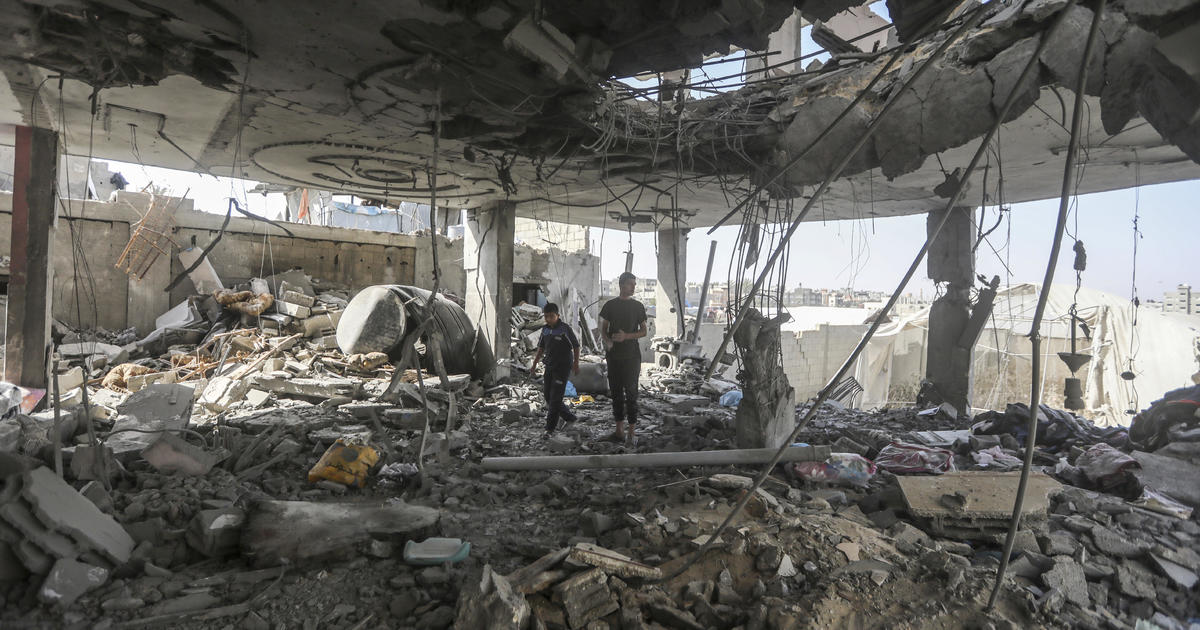GOP White House hopefuls reject welcoming Palestinian refugees, a group seldom resettled by the U.S.
Washington — Republican presidential candidates have come out forcefully against the U.S. welcoming Palestinian refugees fleeing the intensifying war between Israel and Hamas in the Gaza Strip, claiming that their culture is incompatible with American values and that they could be terrorists.
The specter of a broader regional conflict and refugee crisis has intensified recently after the U.S.-designated terrorist group Hamas carried out a series of brutal attacks in southern Israel earlier this month, killing more than 1,400 people and abducting some 200 more. Israel has retaliated with a barrage of air strikes into Hamas-controlled Gaza that has killed thousands of Palestinians. The Israeli military is also expected to soon launch a ground offensive into the territory, which has had its borders sealed since the Hamas attacks.
The stance against welcoming Palestinian refugees to the U.S. has, in many ways, become the latest litmus test for GOP White House hopefuls. Most of the candidates have endorsed hardline positions on other immigration issues, such as promising mass deportations and denying birthright citizenship to the children of unauthorized immigrants.
However, the Biden administration has not announced any efforts to resettle refugees from Gaza, despite at least one progressive Democratic member of Congress calling for it to do so. Historically, very few Palestinian refugees even come to the U.S., and those who do are heavily vetted by the government.
GOP candidates come out against Palestinian refugees coming to the U.S.
Florida Gov. Ron DeSantis was the first in the field to make his opposition known.
"We cannot accept people from Gaza into this country as refugees, I am not going to do that … Not all of them are Hamas," DeSantis said in a sports bar in Creston, Iowa, on Saturday. "But they are all antisemitic. None of them believe in Israel's right to exist."
DeSantis also linked the war between Israel and Hamas to Republican criticism of President Biden's handling of the U.S.-Mexico border: "What this also raises is the question of how much risk do we [now] have, as Americans, because of this open border?"
He challenged the rest of the GOP field to follow his lead during an interview on "Face the Nation" on Sunday. Asked by moderator Margaret Brennan how he can paint such a broad brush about the 2.3 million Gaza residents, DeSantis claimed there was a "toxic culture" perpetuated by an education system in Gaza that prepares "very young kids to commit terrorist attacks."
"If we were to import large numbers of those [residents] to the United States, I think it would increase antisemitism in this country, and I think it would increase anti-Americanism in this country," he said.
Asked by CNN to respond to his comments, former U.S. Ambassador to the United Nations Nikki Haley said "half" of Gaza's residents did not want to be under Hamas' rule, and that "America's always been sympathetic to the fact that you can separate civilians from terrorists."
Her comment has spurred some swipes from DeSantis. On Sunday, he said Haley "would import people," and said she is "trying to be politically correct" in an interview on Monday with NBC News. A Haley spokesperson said that Haley "opposes the U.S. taking in Gazans. She thinks Hamas-supporting countries like Iran, Qatar, and Turkey should take any refugees."
"I've always said we shouldn't take any Gazan refugees into the U.S. I said it when I was at the [United Nations] that we shouldn't take Syrian refugees into the U.S. I believe that those in the region should take them," Haley said on Fox News on Tuesday.
In Iowa on Monday, former President Donald Trump, the frontrunner in the GOP race, said he would suspend refugee resettlement, including a ban on refugees from Gaza.
"Some very, very rough people come out of those areas. They want to blow up our country. We aren't bringing in anyone from Gaza, Syria, Somalia, Yemen or Libya, or anywhere else that threatens our security," he said.
In Washington on Monday, South Carolina Sen. Tim Scott disagreed with DeSantis' assertion that all Gazans are antisemitic, but said banning refugees from Gaza is "the right decision."
"I don't think that they're all antisemitic. I just can't tell you who's who," he said at a Georgetown University foreign policy discussion.
The U.S. admits small numbers of Palestinian refugees
The U.S. has not historically resettled large numbers of Palestinians under the Refugee Admissions Program, formally established in 1980 to provide a safe haven for some foreigners fleeing persecution due to their race, nationality, religion, politics or membership in a social group.
In fiscal year 2023, for example, the U.S. welcomed just 56 Palestinian refugees, or 0.09% of the 60,014 refugees resettled during the time period, according to State Department data. In fiscal year 2022, that number was 16. Over the past 10 years, fewer than 600 Palestinians have arrived in the U.S. under the refugee program, the statistics show.
One of the main reasons for the low number of Palestinian refugee admissions in the U.S. is that most of the millions of displaced Palestinians are treated differently than other refugee-like populations by the United Nations, historically the main source of refugee referrals to the U.S.
Unlike other refugees registered by the U.N. refugee agency, displaced Palestinians in Gaza, the West Bank, Syria, Jordan and Lebanon are under the mandate of the U.N. Relief and Works Agency for Palestine Refugees in the Near East, or UNRWA. While this American-funded agency provides them basic necessities, it cannot refer them for resettlement options in the U.S. or other countries.
The U.N. created this different treatment category through its refugee convention in 1951, making descendants of the original Palestinian refugees — those displaced in the late 1940s — eligible for UNRWA assistance, without the traditional refugee status.
The refugee vetting process is extensive
The refugee process takes an average of between 18 to 24 months to complete due to multiple layers of security screenings, interviews, medical checks and other reviews by the U.S. government.
Prospective refugees must submit biographical information and biometrics to American-funded centers abroad that check their names against U.S. security watchlists. Staff at these centers interview applicants and prepare their cases for U.S. refugee officers, who also interview prospective refugees to determine whether they meet the refugee definition. If the officer finds their testimony credible and consistent with conditions of the countries of origin, they can conditionally approve cases for resettlement.
The government conducts several security screenings on approved refugees before they arrive in the U.S., using databases from the FBI and other agencies in an effort to ensure they won't pose a national security threat to the U.S. The last step is a medical check to ensure refugees will not spread a communicable disease. Once refugees undergo this exam and pass all screenings, they can obtain final approval to enter the U.S.



